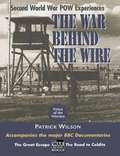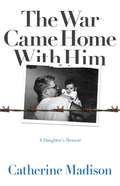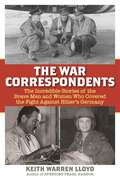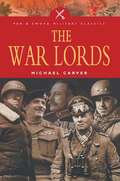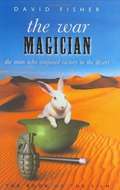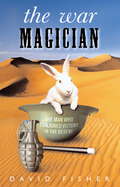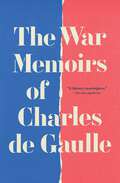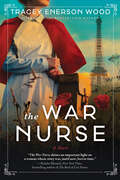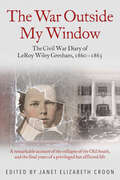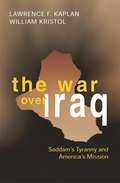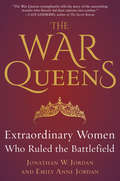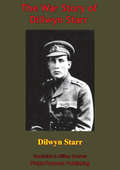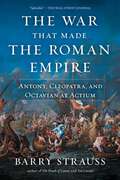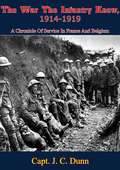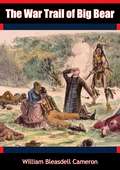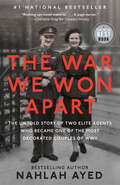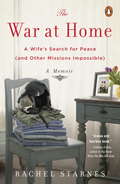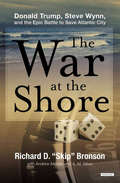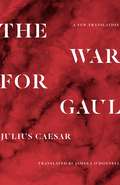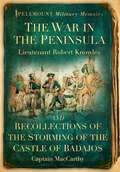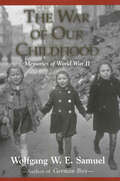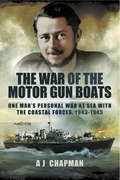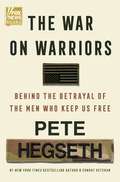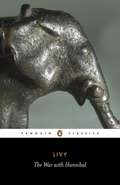- Table View
- List View
The War Behind the Wire: Second World War POW Experiences (Voices of the Veterans)
by Patrick WilsonPublished to coincide with the major 2 part BBC1 series (Autumn 2000) of the same name, War Behind the Wire focuses on the capture, interrogation, the comradeship of camp life, escape planning and forgery techniques, tunnelling, the thrill of life on the run, re-capture and punishment, the joy of liberation. All these experiences and more are vividly described by former POWs of the Second World War and their German camp guards, in War Behind the Wire.Through gripping first-hand accounts enhanced with numerous illustrations, we learn the true story of the ill-fated Great Escape, which ended in the barbaric murder of 50 gallant men of many nationalities. Former inmates tell what life in Colditz Castle was really like.War Behind the Wire is an inspiring book of memories and experiences of those who never gave up hope. These will be as unforgettable for the reader as they were for those who found themselves in captivity.
The War Came Home with Him: A Daughter's Memoir
by Catherine MadisonDuring his years as a POW in North Korea, &“Doc&” Boysen endured hardships he never intended to pass along, especially to his family. Men who refused to eat starved; his children would clean their plates. Men who were weak died; his children would develop character. They would also learn to fear their father, the hero. In a memoir at once harrowing and painfully poignant, Catherine Madison tells the stories of two survivors of one man&’s war: a father who withstood a prison camp&’s unspeakable inhumanity and a daughter who withstood the residual cruelty that came home with him.Doc Boysen died fifty years after his ordeal, his POW experience concealed to the end in a hidden cache of documents. In The War Came Home with Him, Madison pieces together the horrible tale these papers told—of a young captain in the U.S. Army Medical Corps captured in July 1950, beaten and forced to march without shoes or coat on icy trails through mountains to camps where North Korean and Chinese captors held him for more than three years. As the truth about her father&’s past unfolds, Madison returns to a childhood troubled by his secret torment to consider, in a new light, the telling moments in their complex relationship.Beginning at her father&’s deathbed, with all her questions still unspoken, and ending with their final conversation, Madison&’s dual memoir offers a powerful, intimate perspective on the suppressed grief and thwarted love that forever alter a family when a wounded soldier brings his war home.
The War Correspondents: The Incredible Stories of the Brave Men and Women Who Covered the Fight Against Hitler's Germany
by Keith Warren LloydThe War Correspondents unveils the extraordinary bravery and unmatched literary legacy of the journalists who risked their lives to cover WWII&’s European TheaterErnie Pyle, John Steinbeck, Walter Cronkite, Edward R. Murrow, Ernest Hemingway, Bill Mauldin, Robert Capa, Margaret Bourke-White, Andy Rooney, Martha Gellhorn, Richard Tregaskis—the list of American correspondents who covered the fighting in Europe during the Second World War is a veritable Who&’s Who of American literary and journalistic greats of the twentieth century. War correspondents not only rubbed shoulders with generals, admirals, prime ministers, and presidents, they also often witnessed the fighting first-hand and up close, placing themselves at great personal risk in order to get the story. The War Correspondents recounts the most destructive conflict in human history, from the civil war in Spain to the ultimate collapse of the Third Reich, and tells the story of the legendary reporters who accompanied Allied soldiers, sailors, and airmen into battle.
The War Lords: Military Commanders Of The Twentieth Century (Pen & Sword Military Classics)
by Michael CarverDetailed profiles of forty-three military commanders of the twentieth century, from Patton to Rommel, Yamamoto, and Zhukov, written by top historians. In The War Lords, Field Marshal Lord Carver has assembled an engrossing series of short, detailed biographies of forty-three of the dominant military commanders on the twentieth-century world stage, written by such prominent historians as Alistair Horne, Norman Stone, Stephen Ambrose, Lord Kinross, and Martin Middlebrook. Included are: Field-Marshal the Earl Alexander, E.H.H. Allenby, Claude Auchinleck, Field-Marshal Sir, Omar N. Bradley, General of the Army, Andrew Browne Cunningham, Admiral of the Fleet the Viscount, Karl Doenitz, Admiral, Hugh C.T. Dowding, Air Chief Marshal, Dwight D. Eisenhower, General of the Army, Ferdinand Foch, Bernard Freyberg, Lieutenant-General Lord, Heinz Guderian, General, Douglas Haig, William F. Halsey, Fleet Admiral, Ian Hamilton, Arthur Harris, Marshal of the Royal Air Force Sir, Paul von Hindenburg, John Rushworth Jellicoe, Joseph Joffre, Alphonse Juin, Marshal, Mustafa Kemal, Ivan Koniev, Marshal, Erich Ludendorff, Douglas C. MacArthur, General of the Army, John Monash, Bernard L. Montgomery, of Alamein, Louis Mountbatten, Earl of Burma, Chester W. Nimitz, Fleet Admiral, George S. Patton, General, John J. Pershing, Philippe Petain, Erwin Rommel, Field-Marshal, William Joseph Slim, Field-Marshal the Viscount, Carl A. Spaatz, General, Raymond A. Spruance, Admiral, Joseph W. Stilwell, General, Marshal of the Royal Air Force Lord Tedder, Hugh Trenchard, Erich Von Falkenhayn, Erich Von Manstein, Field Marshal, Gerd Von Rundstedt, Field-Marshal, Archibald Wavell, Field-Marshal Earl, Isoroku Yamamoto, Admiral & Georgii Zhukov, Marshal.
The War Magician: The Man Who Conjured Victory In The Desert
by David FisherJasper Maskelyne was a world famous magician and illusionist in the 1930s. When war broke out, he volunteered his services to the British Army and was sent to Eygpt where the desert war had just begun. He used his skills to save the vital port of Alexandria from German bombers and to 'hide' the Suez Canal from them. He invented all sorts of camouflage methods to make trucks look like tanks and vice versa. Working for military intelligence, he put on a stage show inside the Royal Palace in Cairo in order to locate an enemy spy's radio transmitter. On Malta he developed 'the world's first portable holes': fake bomb craters used to fool the Germans into thinking they had hit their targets. His war culminated in the brilliant deception plan that won the Battle of El Alamein: the creation of an entire dummy army in the middle of the desert. Originally published in 1985. British spelling and punctuation is used.
The War Magician: The man who conjured victory in the desert
by David FisherThe incredible true story of the greatest illusionist of modern times and the man who altered the course of the second world war.Soon to be a major film starring Benedict CumberbatchPerfect for fans of OPERATION MINCEMEATJasper Maskelyne was a world famous magician and illusionist in the 1930s. When war broke out, he volunteered his services to the British Army and was sent to Egypt where the desert war had just begun. Here, he used his unique skills to save the vital port of Alexandria from German bombers and to 'hide' the Suez Canal from them. He invented all sorts of camouflage methods to make trucks look like tanks and vice versa. On Malta he developed 'the world's first portable holes': fake bomb craters used to fool the Germans into thinking they had hit their targets. His war culminated in the brilliant deception plan that won the Battle of El Alamein: the creation of an entire dummy army in the middle of the desert.
The War Memoirs
by Charles de GaulleThe complete war memoirs of the resistance leader Charles de Gaulle, who led France out of its darkest hour during the Nazi occupation during World War II.&“Faced with the political disaster, I had to become France.&” This was how Charles de Gaulle answered the call of history. One of the few French battlefield leaders to have distinguished himself in May 1940, he had become the undersecretary of state for national defense. But when the government rejected his calls to fight on and prepared to capitulate to Hitler, he escaped to London. There he instigated a resistance calling on &“all the French who want to remain free to listen to me and follow me&” in the legendary radio address of June 22. He was sentenced to death in absentia as his country made a disgraceful peace, but his Free France movement rallied people around the world to resist German occupation and fight for the liberation of Europe. Originally published in three volumes, The War Memoirs of Charles de Gaulle is the story of the resurrection of France from its darkest hour collaborating with Hitler and the Nazi empire. The first section, &“The Call,&” examines the years leading up to France&’s defeat and the confusion and despair triggered by Hitler&’s blitzkrieg. The second section, &“Unity,&” describes de Gaulle&’s struggles to rally the French in both Africa and underground movements throughout Europe, and often bitter conflicts with the Allied leaders as he sought legitimacy and resources. &“Salvation,&” the final installment, chronicles the turning of the tide of war against Nazi Germany, de Gaulle&’s triumphant return to France, and the reincarnation of the French Republic as a major international presence. De Gaulle&’s great prophecy of 1940 had been fulfilled: France had lost a battle, but she did not lose the war.
The War Nurse: A Novel
by Tracey Enerson Wood"Any readers who enjoyed the mix of romance, intrigue, and medical accuracy of Call the Midwife will love The War Nurse."—New York Journal of Books"[An] impeccably researched, well-drawn, based-on-a-true-story tale, written by a former RN...The War Nurse shines an important light on a woman whose story was, until now, lost to time."—Kristin Harmel, New York Times bestselling author of The Book of Lost NamesBased on a true story, The War Nurse is a sweeping historical novel by USA Today bestselling author Tracey Enerson Wood that takes readers on an unforgettable journey through WWI France.She asked dozens of young women to lay their lives on the line during the Great War. Can she protect them?Superintendent of Nurses Julia Stimson must recruit sixty-four nurses to relieve the battle-worn British, months before American troops are ready to be deployed. She knows that the young nurses serving near the front lines will face a challenging situation, but nothing could have prepared her for the chaos that awaits when they arrive at British Base Hospital 12 in Rouen, France. The primitive conditions, a convoluted, ineffective system, and horrific battle wounds are enough to discourage the most hardened nurses, and Julia can do nothing but lead by example—even as the military doctors undermine her authority and make her question her very place in the hospital tent.When trainloads of soldiers stricken by a mysterious respiratory illness arrive one after the other, overwhelming the hospital's limited resources, and threatening the health of her staff, Julia faces an unthinkable choice—to step outside the bounds of her profession and risk the career she has fought so hard for, or to watch the people she cares for most die in her arms.Fans of Martha Hall Kelly's Lost Roses and Marie Benedict's Lady Clementine will devour this mesmerizing celebration of some of the most overlooked heroes in history: the fierce, determined, and brave nurses who treated soldiers in World War I.Praise for The War Nurse:"Through careful research, this book shows the incredible bravery and compassion of women who find themselves in extraordinary situations."—Julia Kelly, international bestselling author of The Last Garden in England and The Light Over London"A rich, gripping history of one woman's lifelong battle against systemic prejudice."—Stewart O'Nan, award-winning author of The Good Wife"Once again, Tracey Enerson Wood, with her impeccable research and evocative prose, kept me glued to the page. Wood has a talent for bringing strong, yet lesser-known women from history, to life."—Linda Rosen, author of The Disharmony of Silence"A riveting and surprisingly timely story of courage, sacrifice, and friendship forged at the front lines."—Kelly Mustian, author of The Girls in the Stilt House"If you, like me, are a voyeur of historical drama that unfolds as if the kitchen window flew open and the characters were caught in action, then The War Nurse is for you."—Diane Dewey, author of Fixing the Fates"Fans of Patricia Harman will love Wood's treatment of medical expertise in a historical setting."—Booklist
The War Outside My Window: The Civil War Diary of LeRoy Wiley Gresham, 1860-1865
by Janet Elizabeth CroonA remarkable account of the collapse of the Old South and the final years of a young boy’s privileged but afflicted life.LeRoy Wiley Gresham was born in 1847 to an affluent slave-holding family in Macon, Georgia. After a horrific leg injury left him an invalid, the educated, inquisitive, perceptive, and exceptionally witty twelve-year-old began keeping a diary in 1860—just as secession and the Civil War began tearing the country and his world apart. He continued to write even as his health deteriorated until both the war and his life ended in 1865. His unique manuscript of the demise of the Old South is published here for the first time in The War Outside My Window.LeRoy read books, devoured newspapers and magazines, listened to gossip, and discussed and debated important social and military issues with his parents and others. He wrote daily for five years, putting pen to paper with a vim and tongue-in-cheek vigor that impresses even now, more than 150 years later. His practical, philosophical, and occasionally Twain-like hilarious observations cover politics and the secession movement, the long and increasingly destructive Civil War, family pets, a wide variety of hobbies and interests, and what life was like at the center of a socially prominent wealthy family in the important Confederate manufacturing center of Macon. The young scribe often voiced concern about the family’s pair of plantations outside town, and recorded his interactions and relationships with servants as he pondered the fate of human bondage and his family’s declining fortunes.Unbeknownst to LeRoy, he was chronicling his own slow and painful descent toward death in tandem with the demise of the Southern Confederacy. He recorded—often in horrific detail—an increasingly painful and debilitating disease that robbed him of his childhood. The teenager’s declining health is a consistent thread coursing through his fascinating journals. “I feel more discouraged [and] less hopeful about getting well than I ever did before,” he wrote on March 17, 1863. “I am weaker and more helpless than I ever was.” Morphine and a score of other “remedies” did little to ease his suffering. Abscesses developed; nagging coughs and pain consumed him. Alternating between bouts of euphoria and despondency, he often wrote, “Saw off my leg.”The War Outside My Window, edited and annotated by Janet Croon with helpful footnotes and a detailed family biographical chart, captures the spirit and the character of a young privileged white teenager witnessing the demise of his world even as his own body slowly failed him. Just as Anne Frank has come down to us as the adolescent voice of World War II, LeRoy Gresham will now be remembered as the young voice of the Civil War South.Winner, 2018, The Douglas Southall Freeman Award
The War Over Iraq: Saddam's Tyranny and America's Mission
by Lawrence F. Kaplan William CristolThe importance of how we act.
The War Queens: Extraordinary Women Who Ruled the Battlefield
by Jonathan W. Jordan Emily Anne JordanRecently adapted into the War Queens podcast hosted by authors Emily and Jon Jordan, featuring Game of Thrones star Nathalie Emmanuel. Now available on Apple, Spotify, Audible, and all major listening platforms.&“Masterfully captures the largely forgotten saga of warrior queens through the ages . . . an epic filled with victory, defeat, and legendary women.&” —Patrick K. O&’Donnell, bestselling author of The Indispensables History&’s killer queens come in all colors, ages, and leadership styles. Elizabeth Tudor and Golda Meir played the roles of high-stakes gamblers who studied maps with an unblinking, calculating eye. Angola&’s Queen Njinga was willing to shed (and occasionally drink) blood to establish a stable kingdom in an Africa ravaged by the slave trade. Caterina Sforza defended her Italian holdings with cannon and scimitar, and Indira Gandhi launched a war to solve a refugee crisis. From ancient Persia to modern-day Britain, the daunting thresholds these exceptional women had to cross—and the clever, sometimes violent ways in which they smashed obstacles in their paths—are evoked in vivid detail. The narrative sidles up to these war queens in the most dire, tumultuous moments of their reigns and examines the brilliant methods and maneuvers they each used to defend themselves and their people from enemy forces. Father-daughter duo Jonathan W. and Emily Anne Jordan extoll the extraordinary power and potential of women in history who walked through war&’s kiln and emerged from the other side—some burnished to greatness, others burned to cinders. All of them, legends. &“Reminds us intelligently, entertainingly and powerfully that strong-willed women have always been the equal—and very often the superior—of their male counterparts, even in the field historically most jealously reserved for men: warfare.&” —Andrew Roberts, New York Times–bestselling author &“This book should be required reading for anyone who loves history.&” —James M. Scott, Pulitzer Prize finalist
The War Story Of Dillwyn Parrish Starr
by Louis Starr Dillwyn Parrish StarrDillwyn Parrish Starr led a short life but he lived it at a tremendous speed, when the First World War broke out he was a star American Football Player and scholar at Harvard. However spurred on by his convictions he sailed to the U.K. in a rush and signed up for service as soon as possible; thereafter he saw a great deal of fighting with the Royal Navy Armored car detachment. However as the war stagnated to the static bloody fighting in the trenches he felt compelled to transfer to the prestigious Grenadier Guards in the British Army. Always heavily engaged Dillwyn fought with great courage in both Flanders and on the Gallipoli campaign, before falling to the overwhelming fire of the Germans at Ginchy during the infernal Somme battle in 1916. His letters are a vivid memento to a man who was universally respected even in a regiment with such high standards as the Grenadiers Guards, cheerful and upbeat snuffed out too soon in the hell of World War One.
The War That Made the Roman Empire: Antony, Cleopatra, and Octavian at Actium
by Barry StraussA &“splendid&” (The Wall Street Journal) account of one of history&’s most important and yet little-known wars, the campaign culminating in the Battle of Actium in 31 BC, whose outcome determined the future of the Roman Empire.Following Caesar&’s assassination and Mark Antony&’s defeat of the conspirators who killed Caesar, two powerful men remained in Rome—Antony and Caesar&’s chosen heir, young Octavian, the future Augustus. When Antony fell in love with the most powerful woman in the world, Egypt&’s ruler Cleopatra, and thwarted Octavian&’s ambition to rule the empire, another civil war broke out. In 31 BC one of the largest naval battles in the ancient world took place—more than 600 ships, almost 200,000 men, and one woman—the Battle of Actium. Octavian prevailed over Antony and Cleopatra, who subsequently killed themselves. The Battle of Actium had great consequences for the empire. Had Antony and Cleopatra won, the empire&’s capital might have moved from Rome to Alexandria, Cleopatra&’s capital, and Latin might have become the empire&’s second language after Greek, which was spoken throughout the eastern Mediterranean, including Egypt. In this &“superbly recounted&” (The National Review) history, Barry Strauss, ancient history authority, describes this consequential battle with the drama and expertise that it deserves. The War That Made the Roman Empire is essential history that features three of the greatest figures of the ancient world.
The War The Infantry Knew, 1914-1919: A Chronicle Of Service In France And Belgium
by Capt. J. C. DunnMemoirs of British medical officer J. C. Dunn during World War I: "The first duty of a battalion medical officer in War is to discourage the evasion of duty...not seldom against one's better feelings, sometimes to the temporary hurt of the individual, but justice to all other men as well as discipline demands it.""Sometimes, through word of mouth and shared enthusiasm, a secret book becomes famous. The War the Infantry Knew is one of them. Published privately in a limited edition of five hundred copies in 1938, it gained a reputation as an outstanding account of an infantry battalion's experience on the Western Front."--Daily Telegraph"I have been waiting for a long time for someone to republish this classic. It is one of the most interesting and revealing books of its type and is a genuinely truthful and fascinating picture of the war as it was for the infantry"--John Keegan'A remarkably coherent narrative of the battalion's experiences in diary form...a moving historical record which deserves to be added to the select list of outstanding accounts of the First World War"--Times Literary Supplement"A magnificent tour de force, the length of three ordinary books."--London Review of Books
The War Trail of Big Bear, Being the Story of the Connection of Big Bear and other Cree Indian Chiefs
by William Bleasdell CameronFirst published in 1926, this book by William Bleasdell Cameron is the gripping account of his experiences of captivity following the Frog Lake Massacre of the North-West Rebellion of April 2, 1885, of which he was the only male survivor.“On that dread day in April, 1885, when savagery was blood-mad, his constant and understanding kindness to the Indians bore fruit: “Those women are starting for the camp. Go with them; and do not leave them. They will not shoot among the women.” And from that moment until the release of the prisoners two months later he lived amongst them in their wanderings, an intelligent and sympathetic eye-witness of all that happened. This is the story Mr. Cameron has to tell. It is of especial value for its treatment of events on the little-known western front.”—The Washington Historical Quarterly
The War We Won Apart: The Untold Story of Two Elite Agents Who Became One of the Most Decorated Couples of WWII
by Nahlah AyedLove, betrayal, and a secret war: the untold story of two elite agents, one Canadian, one British, who became one of the most decorated couples of WWII.On opposite sides of the pond, Sonia Butt, an adventurous young British woman, and Guy d&’Artois, a French-Canadian soldier and thunderstorm of a man, are preparing for war.From different worlds, their lives first intersect during clandestine training to become agents with Winston Churchill&’s secret army, the Special Operations Executive. As the world&’s deadliest conflict to date unfolds, Sonia and Guy learn how to parachute into enemy territory, how to kill, blow up rail lines, and eventually . . . how to love each other. But not long after their hasty marriage, their love is tested by separation, by a titanic invasion—and by indiscretion.Writing in vivid, heart-stopping prose, Ayed follows Sonia as she plunges into Nazi-occupied France and slinks into black market restaurants to throw off occupying Nazi forces, while at the same time participating in sabotage operations against them; and as Guy, in another corner of France, trains hundreds into a resistance army.Reconstructed from hours of unpublished interviews and hundreds of archival and personal documents, the story Ayed tells is about the ravaging costs of war paid for disproportionately by the young. But more than anything, The War We Won Apart is a story about love: two secret agents who were supposed to land in enemy territory together, but were fated to fight the war apart.
The War We Won Apart: The Untold Story of Two Elite Agents Who Became One of the Most Decorated Couples of WWII
by Nahlah AyedINSTANT #1 NATIONAL BESTSELLERLove, betrayal, and a secret war: the untold story of two elite agents, one Canadian, one British, who became one of the most decorated couples of WWII.On opposite sides of the pond, Sonia Butt, an adventurous young British woman, and Guy d&’Artois, a French-Canadian soldier and thunderstorm of a man, are preparing for war.From different worlds, their lives first intersect during clandestine training to become agents with Winston Churchill&’s secret army, the Special Operations Executive. As the world&’s deadliest conflict to date unfolds, Sonia and Guy learn how to parachute into enemy territory, how to kill, blow up rail lines, and eventually . . . how to love each other. But not long after their hasty marriage, their love is tested by separation, by a titanic invasion—and by indiscretion.Writing in vivid, heart-stopping prose, Ayed follows Sonia as she plunges into Nazi-occupied France and slinks into black market restaurants to throw off occupying Nazi forces, while at the same time participating in sabotage operations against them; and as Guy, in another corner of France, trains hundreds into a resistance army.Reconstructed from hours of unpublished interviews and hundreds of archival and personal documents, the story Ayed tells is about the ravaging costs of war paid for disproportionately by the young. But more than anything, The War We Won Apart is a story about love: two secret agents who were supposed to land in enemy territory together, but were fated to fight the war apart.
The War at Home: A Memoir
by Rachel StarnesWhen she fell in love with her brother's best friend, Rachel Starnes had no idea she was about to repeat a painful family pattern--marrying a man who leaves regularly and for long stretches to work a dangerous job far from home. Through constant relocations, separations, and the crippling doubts of early parenthood, Starnes effortlessly weaves together strands from her past with the relentless pace of Navy life in a time of war. Searingly honest and emotionally unflinching--and at times laugh out loud funny--Starnes eloquently evokes the challenges she faces in trying to find and claim a sense of home while struggling to chart a new path and avoid passing on the same legacy to her two young sons. At once a portrait of the devastating strains that military life puts on families and a meditation on what it means to be left behind, The War at Home is a brave portrait of a modern military family and the realities of separation, endurance, and love that overcomes. Praise for The War at Home:"Rachel Starnes's The War at Home navigates the joys, fears, compromises, and casualties that create the terrain of marriage. And if you are a military spouse, her memoir will reveal thoughts you never even knew you had. This is a wise and fearless book." --Siobhan Fallon, author of You Know When the Men Are Gone "One of the most honest and genuine memoirs I've ever read, as well as one of the most finely written. There's not a false note in these pages. Rachel Starnes's story is at once both singular and emblematic. . . . The War at Home is that rare thing: a book about the here and now that promises to last well beyond next month or next year." --Steve Yarbrough, award-winning author of The Realm of Last Chances and Safe from the NeighborsFrom the Trade Paperback edition.
The War at the Shore: Donald Trump, Steve Wynn, and the Epic Battle to Save Atlantic City
by Richard D. Bronson Andrew Meisler A. M. Silver“With Trump and Wynn, Skip Bronson nails the drama and muscle of a Super Bowl Sunday . . . A manual of strategy and tactics, smeared with sweat and blood” (Steve Tisch, chairman of the New York Giants). From 1995 to 2000, two of the world’s best-known companies―Mirage Resorts and Trump Resorts―run by two of the most flamboyant businessmen of our time, fought a bare-knuckled, high-stakes battle over a prime piece of real estate in one of America’s most famous resort towns. No money was spared, no punch was pulled, no invective went unhurled in what became known as “The War at the Shore.” Now Bronson, who was a member of the board of directors of the Mirage and president of New City Development Company, the Mirage subsidiary whose primary purpose was to build a top-level new casino and hotel complex in Atlantic City, tells the inside story of this epic struggle. Along the way, Bronson weaves in fascinating and inspiring anecdotes from his complicated past. Gripping from beginning to end, The War at the Shore is a rare up-close look at the world of casino development and the essential modern chapter in the history of America’s “Boardwalk Empire.” “Two powerful personalities clash in this first-hand account of Steve Wynn’s bid to open a new casino on Donald Trump’s turf. . . . An engaging insider’s account of the down-and-dirty machinations that go into high-stakes real estate development.” —Kirkus Reviews “Marked by casinos, boardrooms, and double-dealings, Bronson’s account is a vivid portrayal of Atlantic City’s revitalization.” —LA Confidential “What an amazing backstage look into the world of casinos, moguls and politics.” —Peter Morton, chairman & founder of Hard Rock Hotel & Casino and Hard Rock Cafes
The War for Gaul: A New Translation
by Julius CaesarA new translation that captures the gripping power of one of the greatest war stories ever told—Julius Caesar’s pitiless account of his brutal campaign to conquer GaulImagine a book about an unnecessary war written by the ruthless general of an occupying army—a vivid and dramatic propaganda piece that forces the reader to identify with the conquerors and that is designed, like the war itself, to fuel the limitless political ambitions of the author. Could such a campaign autobiography ever be a great work of literature—perhaps even one of the greatest? It would be easy to think not, but such a book exists—and it helped transform Julius Caesar from a politician on the make into the Caesar of legend. <P><P>This remarkable new translation of Caesar’s famous but underappreciated War for Gaul captures, like never before in English, the gripping and powerfully concise style of the future emperor’s dispatches from the front lines in what are today France, Belgium, Germany, and Switzerland. <P><P>While letting Caesar tell his battle stories in his own way, distinguished classicist James O’Donnell also fills in the rest of the story in a substantial introduction and notes that together explain why Gaul is the “best bad man’s book ever written”—a great book in which a genuinely bad person offers a bald-faced, amoral description of just how bad he has been. <P><P>Complete with a chronology, a map of Gaul, suggestions for further reading, and an index, this feature-rich edition captures the forceful austerity of a troubling yet magnificent classic—a book that, as O’Donnell says, “gets war exactly right and morals exactly wrong.”
The War in the Peninsula and Recollections of the Storming of the Castle of Badajos: Some Letters of a Lancashire Officer
by Ian Fletcher Robert Knowles Captain MacCarthy MacCarthyLieutenant Knowles served in the 7th (Royal) Fusiliers 1811-1813, seeing action in several battles, being wounded at the storming of Badajoz and at the battle of Salamanca. He was killed at Roncesvalles on 25 July 1813 during the Battle of the Pyrenees. By combining the overall picture as painted by Lt Knowles with the specific, bloody narrative of the storming of the Castle by Captain MacCarthy in one volume, this work is not only fantastic value for money but also offers the discerning reader a whole new perspective on the campaign. What did these two men – of different temperaments – make of events? Wellington had watched helplessly at Badajos as the flower of his army was smashed against the ramparts of Badajos: the 4th and Light Divisions attacked no less than 40 times. When they finally succeeded, an orgy of rape, pillage and destruction followed that even the Iron Duke could not quell. What did both men have to say about this? Both of these rare classics are essential reading for students of the period.
The War of Our Childhood: Memories of World War II
by Colonel Wolfgang W. SamuelOne survivor tells of the fire-bombing of Dresden. Another survivor recounts the pervasive fear of marauding Russian and Czech bandits raping and killing. Children recall fathers who were only photographs and mothers who were saviors and heroes. These are typical in the stories collected in The War of Our Childhood: Memories of World War II. For this book Wolfgang W. E. Samuel, a childhood refugee himself after the fall of Nazi Germany, interviewed twenty-seven men and women who as children—by chance and sheer resilience—survived Allied bombs, invading armies, hunger, and chaos. “Our eyes carried no hate, only recognition of what was,” Samuel writes of his childhood. “Peace was an abstraction. The world we Kinder knew nearly always had the word ‘war’ appended to it.” Samuel's heartfelt narratives from these innocent survivors are invariably riveting and often terrifying. Each engrossing story has perilous and tragic moments—school children in Leuna who are sent home during an air raid but are strafed as moving targets; fathers who exist only as distant figures, returning to their families long after the war—or not at all; mothers who are raped and tortured; families who are forced into a seemingly endless relocation that replicates the terrors of war itself. In capturing such experiences from nearly every region of Germany and involving people of every socio-economic class, this is a collection of unique memories, but each account contributes to a cumulative understanding of the war that is more personal than strategic surveys and histories. For Samuel and the survivors he interviewed, agony and fright were part of everyday life, just as were play, wondrous experience, and above all perseverance. “My focus,” Samuel writes, “is on the astounding ability of a generation of German children to emerge from debilitating circumstances as sane and productive human beings.”
The War of the Motor Gun Boats: One Man's Personal War at Sea with the Coastal Forces, 1943–1945
by A. J. ChapmanTony Chapman was born in Southampton in 1924. Aged 16 he watched with horror as the historic High Street of Southampton burnt to the ground in a firestorm caused by a heavy German bombing raid on the night of 30 November 1940. He vowed to join up and fight back. Tony joined the Navy.Within hours of being posted to his first Motor Gun Boat, Telegraphist Tony Chapman was involved in an epic Coastal Forces engagement when his flotilla took on a force of thirty E-boats. Although their unit of two MGBs sank three E-Boats, it was at a high cost. Half of Tony's shipmates were killed or injured.This was the start of an eventful and dramatic wartime service with these little warships. Tony's flotilla operated in the Mediterranean and Aegean where the Motor Gun Boats played a key role in this important but often neglected theatre.rnDaily life on these small ships is vividly described. The flotilla had a busy time showing the flag in the Levant and on combined operations in the Aegean with the Greek Sacred Regiment of Commandos. The culmination of their efforts was when Tony's boat, ML838, took the surrender of the Island of Kos in 1945.rnrnWritten from the perspective of one of the other ranks, War of the Motor Gun Boats fills an important gap in the literature of the Second World War.As featured in the North Devon Journal and Exmoor Magazine.
The War on Warriors: Behind the Betrayal of the Men Who Keep Us Free
by Pete HegsethReal men fought for our freedoms. It’s time we fought for theirs. <P><P> Pete Hegseth joined the Army to fight extremists. Then that same Army called him one. The military Pete joined twenty years ago was fiercely focused on lethality, competency, and color blindness. Today our brass are following the rest of our country off the cliff of cultural chaos and weakness. <P><P> Americans with common sense are fighting this on many fronts, but if we can’t save the meritocracy of our military, we’re definitely going to lose everywhere else. <P><P> The War on Warriors uncovers the deep roots of our dysfunction—a society that has forgotten the men who take risks, cut through red tape, and get their hands dirty. The only kind of men prepared to face the dangers that the Left pretends don’t exist. Unlike issues of education or taxes or crime, this problem doesn’t have a zip code solution. We can’t move away from it. We can’t avoid it. We have only one Pentagon. Either we take it back or surrender it altogether. <P><P> Combining his own war experiences, tales of outrage, and an incisive look at how the chain of command got so kinked, this book is the key to saving our warriors—and winning future wars. The War on Warriors must be won by the good guys, because when the shooting really starts, they’re the only ones who can save us. <p> <b>New York Times Bestseller</b>
The War with Hannibal (Books XXI-XXX of the History of Rome from its Foundation)
by Titus LivyThe author gives us a chronological account about the events of the Second Punic War between Rome and Carthage. Translated by Aubrey De Selincourt.
